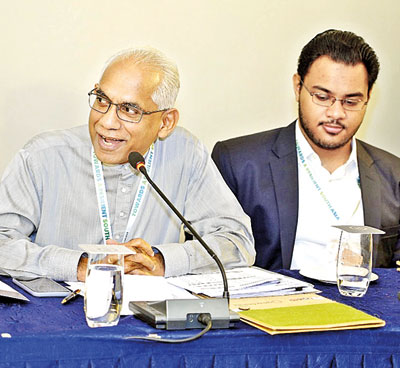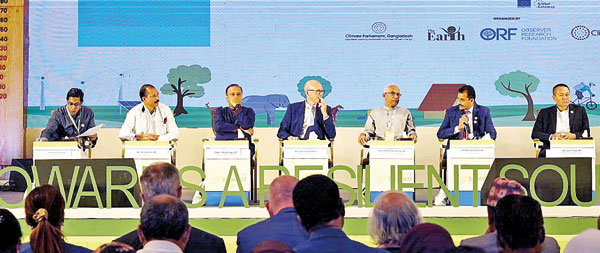News
Moves for a ‘Climate Parliament’ in Sri Lanka
View(s):Parliamentarian Eran Wickramaratne on a mission to get like-minded stakeholders on one platform to adapt to and mitigate the climate crisis while strengthening regional cooperation
By Kumudini Hettiarachchi and Dilushi Wijesinghe
Hot on the heels of a crucial climate conference in Dhaka, Bangladesh, a local Parliamentarian is bent on setting up an all-encompassing ‘Climate Parliament’ in Sri Lanka.
“It is nothing to do with politics. It is all to do with like-minded people getting together to help Sri Lanka and the region meet the challenges of escalating climate issues,” says Samagi Jana Balawegaya (SJB) Parliamentarian Eran Wickramaratne.

Sri Lankan MP Eran Wickramaratne at the discussion on ‘Regional Cooperation for Sustainable Energy: New Architecture for Regional Energy Governance’ at the Regional Climate Summit 2023 in Dhaka, Bangladesh
Such a Climate Parliament has taken off successfully in Bangladesh as well as India and Nepal. They are working towards adapting and mitigating the consequences of climate change, he says, stressing that they are also heavily into regional cooperation.
Bangladesh is vulnerable to both disasters and climate change and ranked the 7th extreme disaster risk-prone country in the world as per the report from the Global Climate Risk Index 2021.
Sri Lanka, meanwhile, is ranked among the top 10 countries on the Global Climate Risk Index (2018-2020) and Mr. Wickramaratne reiterates that “our country is highly vulnerable”.
He goes onto stress that most Sri Lankans are aware of natural disasters such as floods and droughts, but there is another dimension that is not thought of.
“I don’t want to scare people, but I want to be persuasive and prudent,” he says, referring to the graphic as well as tragic images relayed out of eastern Libya, where ‘Storm Daniel’ was followed by two dam bursts at Derna which let out over 30 million cubic metres of water, wiping out cities and killing more than 11,000 people.
Without being a fear-monger, Mr. Wickramaratne has been thinking about how Sri Lanka is focusing on climate change and natural disasters like the tsunami. However, he would like to “raise a red flag” as a follow up on the Libyan disaster and urge a check on structures like dams and high-rises.
With all these thoughts racing through his mind after he attended the Regional Climate Summit 2023 in Dhaka from September 8 to 10, he is already in working mode as a climate crusader. The summit had discussed pressing issues such as financing for climate-related initiatives, ensuring clean air, bolstering energy security and promoting the sustainable utilisation of natural resources.
Mr. Wickramaratne is set to hold an extensive round of discussions with all stakeholders in Sri Lanka before COP28 scheduled from November 30-December 12, this year in Dubai, United Arab Emirates. COP28 is the 28th session of the Conference on Climate Change linked to the UN Framework Convention on Climate Change (UNFCCC).

Discussion on ‘Regional Cooperation for Sustainable Energy: New Architecture for Regional Energy Governance’ at the Regional Climate Summit 2023 in Dhaka, Bangladesh. The keynote speaker was the Ambassador & Head of the European Union to Bangladesh, Charles Whiteley. The speakers were Sri Lankan MP Eran Wickramaratne; Nepal Climate Parliament’s Madhav Sapkota; Indian Climate Parliament’s Vincent Pala; and Bhutan’s Chairperson, Parliament Committee on Environment & Climate Change, Gyem Dorji. The moderator was Waseqa Ayesha Khan
The process Mr. Wickramaratne would follow in setting up a Climate Parliament in Sri Lanka includes an apolitical initiative in principle; informal discussions with Members of Parliament (MPs) to draw attention to climate issues; facilitating the formation of a core group of interested MPs to launch a caucus on climate; expanding this caucus to include environmental specialists and civil society activists; framing of a road map and programme with them; and linking up with other Climate Parliaments and regional and global institutions with similar objectives.
Looking at the ground reality in Sri Lanka, he is happy that everyone is in agreement on the following: having 70% renewable energy by 2030; having carbon emission neutrality by 2050; and that the country should move away from coal (“no more coal”) as a source of energy.
As we talk of hazardous carbon emissions, he has just switched on the air-conditioning in his office room in his home and we wonder whether it is just talk and no action on his part. Sensing this, Mr. Wickramaratne laughingly says that he is not using coal-generated energy for his AC, but solar power, a renewable form of energy, garnered from panels atop his roof. These panels have also brought down his electricity bills.
With regard to carbon emissions, he has a breakdown at hand: 45% of these emissions are largely from the energy sector; 21% from transport; another 21% from industries; and 10% from agriculture.
Urging that Sri Lanka needs to reduce these emissions firstly from the energy sector, he says that there is a clear direction, which is to move more and more towards renewable energy.
Next, Mr. Wickramaratne focuses on hydrocarbon imports which cost over $5 billion per year and keep rising. (A hydrocarbon is an organic compound consisting of hydrogen and carbon found in crude oil, natural gas and coal.) If thermal and hydrocarbon imports are reduced by switching to alternatives of renewable energy such as wind, solar and water, what is needed initially is capital expenditure to set up windmills and solar panels etc. This is because wind, solar and water are totally free and it becomes an investment.
“A recent study has also shown that instead of importing electricity as we do now, if we import wind power from the region, our cost of power will immediately go down by about 30%, while carbon emissions will also reduce by about 20%,” he says, adding that the reality currently is that people are struggling to pay their electricity bills after the recent price-hike.
He explains that it is not just living in darkness for people who cannot pay their bills but a lack of electricity also has a wider impact – children cannot study, cannot read or use computers. So the investment in renewable energy is fully worthit, even if it is imported.
‘Green hydrogen’ is his next focus as he explains that there is an electro-chemical process through which hydrogen and oxygen can be separated. The hydrogen thus separated can be compressed, stored, transported and used for industrial purposes.
Sri Lanka has much potential through offshore wind power to produce green hydrogen, says Mr. Wickramaratne, adding that however there is a need for offshore studies, policy regulation, demonstrations and pilot projects. It also involves technology for which there is a need for international and regional collaboration which has to be absolutely transparent and done in the interests of the country.
The best way to say that you found the home of your dreams is by finding it on Hitad.lk. We have listings for apartments for sale or rent in Sri Lanka, no matter what locale you're looking for! Whether you live in Colombo, Galle, Kandy, Matara, Jaffna and more - we've got them all!

